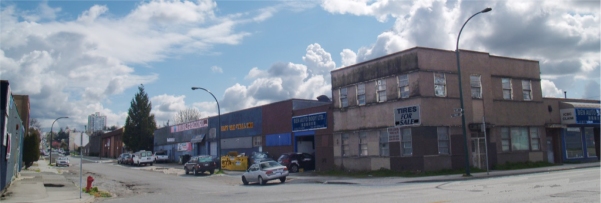 In the hall of the Vancouver Opera rehearsal building, tables were arranged by topics. I usually like to move between tables but this time I stuck with the one focused on Local Economy. Other tables dealt with Arts & Culture, Heritage, Parks and Public Space, Social Sustainability & Social Issues, Transportation and Housing.
In the hall of the Vancouver Opera rehearsal building, tables were arranged by topics. I usually like to move between tables but this time I stuck with the one focused on Local Economy. Other tables dealt with Arts & Culture, Heritage, Parks and Public Space, Social Sustainability & Social Issues, Transportation and Housing.
But there are three topics that keep intriguing me when dealing with community engagement: Participation, Contribution and Ownership.
On Saturday, December 6 the City of Vancouver held a workshop dedicated to exploring residents’ interests and insights for the neighborhood in the next 30 years. What I feel is working in favor of the planning process is a good combination of participation, contribution and ownership. On my way to delivering a workshop at the Urban Design Masters program in UBC it was great to participate in one. I’m inspired by the process going on in Grandview Woodland these days.
Participation: one of the most challenging issues of setting up a workshop is attracting a significant audience.
When it’s sunny outside – they thank you for coming out on such a lovely day; when it rains – they thank you for taking the time. Well yes, no one can promise this process would yield tangible results, let alone benefits to the community. So the fact that people show up is admirable. And residents don’t hesitate to express their complaints: these range from the usual “the rich/the developers always get their way” to the more specific, personal stories of encounters with city policies and the looming threat to maintaining a business.
Contribution: when residents do participate, their contribution to this process can be significant.

Andrew Pask, the City of Vancouver planner for Grandview Woodland in one of his summaries in front of the screen.
Half an hour before the workshop I was still sitting outside the Britannia public library. I’ve exchanged a few words with a guy who was browsing through the garbage bin. He was in search of cans and bottles. It was a rainy morning. “The stuff people throw away in this neighborhood! It’s disgusting!” he grumbled sort of to himself. “So, you’re complaining?” I asked him, intrigued by the scene and curious to tap into his message. Homelessness was mentioned quite a bit throughout the day. The main issue was concern for those who seem to be entrenched in this type of living. The homeless is our symbol for everything that’s bad about gentrification, rightfully or not. Whether you need to move away to a cheaper space or are at risk of being thrown to the streets, talking about the homeless is not only an expression of care to those who are there: it is a tangible fear for our own fate.
Ownership: when you come to a workshop and contribute to its discussions, chances are that your care and attachment to the neighborhood increase.
As my talk with the guy collecting bottles extended a bit, I’ve heard that he comes from Saskatchewan. He is in touch with his family there. He seemed pretty interested to know where I was heading. But when the library opened at 9:30 AM the man slipped inside with the rest of the people waiting outside. I headed a few blocks south to where the workshop was about to begin. Eventually I couldn’t notice the guy at the workshop. But whatever story this encounter had entailed, I took it as just another one that makes this neighborhood.
Question: “Does this process help City Hall ease its way to execute a predetermined agenda or does it truly engage the community in meaningful development of our city?” The two parts of this question don’t seem contradictory to me. However, if participation, contribution and ownership are core elements of community engagement, trust, education and futility are a the real challenge of its purpose. Here is an interesting article relating to this.
Moving forward is an interest we usually have as much as it tends to be a necessity. “OK, so now what?” you may ask. On our way to action, questions can be useful. In Grandview Woodland it looks like the sense of ownership is strong. This makes for significant participation. The challenge is in how to turn the contributions made, into significant moves forward – for the benefit of current residents as well as future populations.
